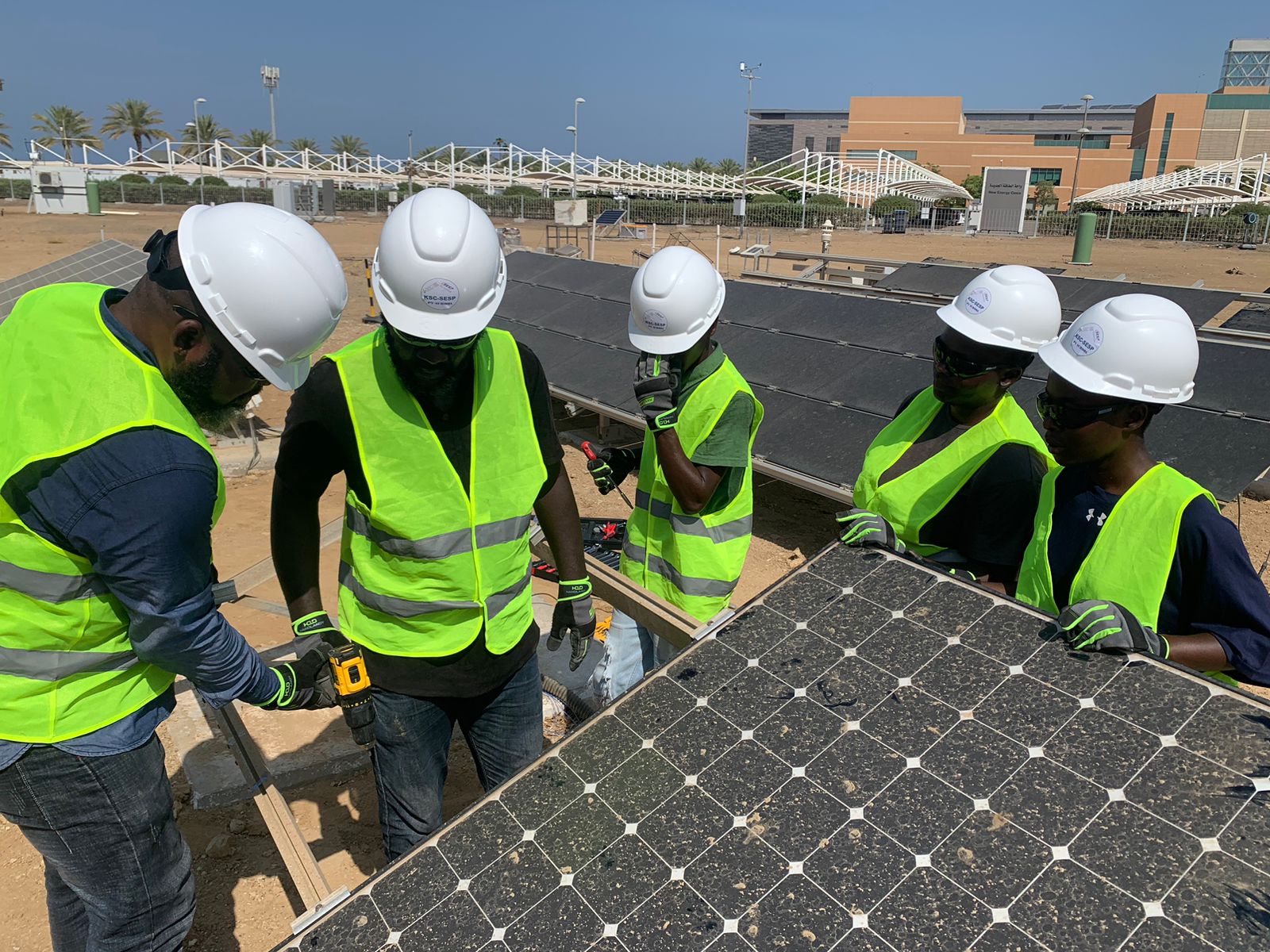KAUST researchers share technology with Moving Windmills to help underserved communities in Africa

Moving Windmills assembling solar panels at KAUST
Rarely does a humble high school dropout outshine a stage shared with famous footballers like Didier Drogba or with scientists growing human organs in pigs like Juan Carlos Izpisua-Belmonte. But then, few high school dropouts are William Kamkwamba. Also known as The Boy Who Harnessed the Wind, a sobriquet from the book and film about his life, Kamkwamba is world renowned for constructing a windmill to power a broken water pump in his Malawi village using no more than a book, some scraps, and his ingenuity and determination. Last September, members from his non-profit organization, Moving Windmills, visited KAUST to learn new skills on green energy infrastructure. Moving Windmills will use this knowledge to coordinate energy projects across Malawi.
Kamkwamba, Drogba, and Belmonte were just some of the top opinion leaders at KAUST in January to speak at the annual Winter Enrichment Program (WEP). WEP exemplifies the extraordinary opportunities at KAUST. For two weeks every winter, it brings people of outstanding accomplishment to the campus to share their stories and insights. For many this year, Kamkwamba’s talk was the one that captured the greatest attention and admiration.
“Watching the movie was an incredibly humbling experience. The villagers were starving, and William’s father was going without food to ensure there was some for the children,” said Nicki Talbot, Director of the KAUST Enrichment for Youth (KEY), about Kamkwamba’s story.
Talbot was the one who reached out to Kamkwamba to join WEP. "We sent a couple of emails, and didn’t get any response. Then – out of the blue – I get a phone call from Olivia Kamkwamba, William’s wife. She was very excited for him to come."
William's story was so inspiring that Talbot had no trouble introducing him to many KAUST faculty. Right away, KAUST was thinking of how they could support the group.
“William spoke to us about solar panels that had been donated to the foundation. We immediately offered to provide some training to the people who would be installing and maintaining them,” said Professor Frédéric Laquai of the KAUST Solar Center.
While the book and movie have brought worldwide attention to Moving Windmills, the organization lacks the expertise to match the generous donations it is receiving. Laquai and his colleagues realized that no matter how sophisticated the donated technologies, nothing would move forward without technical expertise.
Muhammed Abbasi, a colleague of Laquai’s at the KAUST Solar Center set up a one-week training program at KAUST for September. Eleven members of Moving Windmills visited.
"The training program encompassed a comprehensive curriculum, including hands-on training for the installation of solar photovoltaic systems specifically designed to be used in Malawi, such as those for solar water pumps, rooftop solar on school buildings, and ground mount systems for villages. Additionally, participants gained insights into design, testing, operations, and maintenance of solar photovoltaic systems," he said.

Moving Windmills in KAUST laboratories
Despite its name, Moving Windmills has morphed into an organization that seeks environmental solutions for underserved communities. This is why the delegation also brought water samples from their village that they shared with Prof. Peiying Hong. Hong is developing cheap sensors to measure bacteria in water. The visit was an excellent opportunity to share her technology with regions that do not have sufficient budget to test drinking and cooking water.
"I wanted to work with Moving Windmills because I believe if my research can help advance the UN SDG 6 goal and facilitate access to clean water and sanitation infrastructure for less privileged communities, then I should not walk away from that opportunity," she said.
Her Ph.D. student Julie Sanchez Medina and research scientist Dr. Yanghui Xiong instructed the visitors on how to analyze the water samples.
"Our team have had the experience of a lifetime at KAUST, and the knowledge and technology KAUST has generously shared will allow us to feed more people and educate more children in our communities. KAUST has demonstrated what it means to be a true global partner," said Olivia Kamkwamba.
Talbot added that Saudi Arabia benefits when KAUST works with regions that cannot adopt standard technologies because of the cost and lack of infrastructure.
"They are thinking outside the box to bring electricity to the country," she said of Moving Windmills. "This same approach will apply to KAUST bringing energy and clean water to remote parts of Saudi Arabia."

